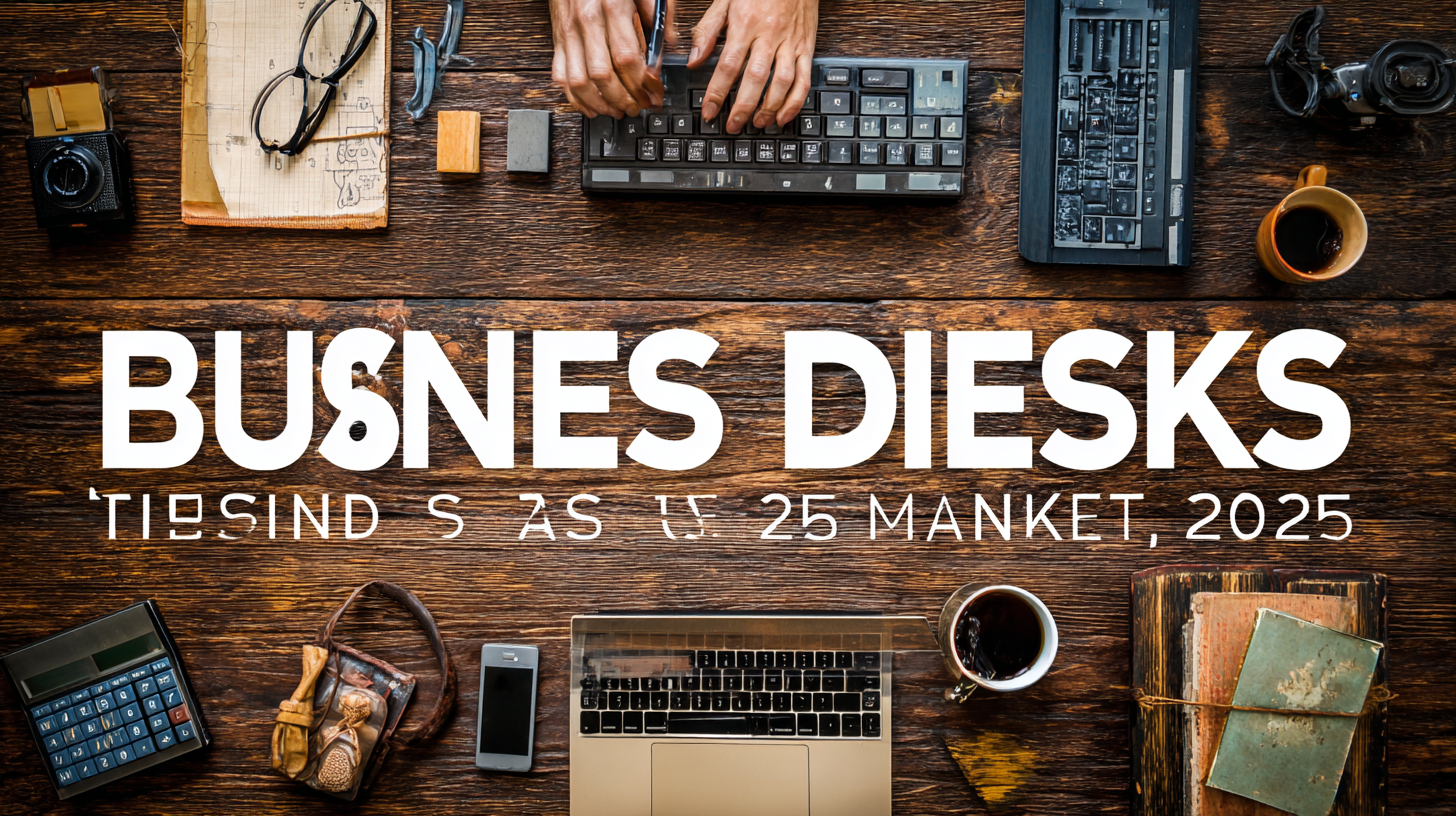Largest Selection of New and Used Office Furniture! Call 1-855-885-3375 or visit a showroom today!
Blog
Trends in the Global Business Desk Market for 2025 Insights and Projections
As we look toward 2025, the global business desk market is poised for significant transformation, driven by evolving work environments and technological advancements. Business desks, once simple furniture items, are becoming multifunctional spaces that facilitate collaboration and innovation. The rise of hybrid working models has reshaped workplace design, emphasizing the need for versatile and adaptive desk solutions.

In this blog, we will explore the latest trends influencing the business desk market, including the integration of digital technologies and ergonomic designs aimed at enhancing productivity and comfort. Additionally, we will provide insights and projections regarding consumer preferences and market dynamics, highlighting key players and emerging innovations in the industry. As businesses continue to adapt to a rapidly changing landscape, understanding these trends is essential for navigating the future of workspace design.
Key Industry Applications of Business Desks in the Post-Pandemic Workplace
The post-pandemic workplace has significantly altered the landscape for business desks, a crucial element of a productive work environment. With the rise of remote work, flexibility has become the cornerstone of modern occupational arrangements. As companies adapt to hybrid models, the focus is shifting toward multifunctional business desks that cater to varying needs, such as adjustable heights for standing options, integrated technology for seamless connectivity, and eco-friendly materials to meet sustainability goals.
Moreover, the emphasis on collaboration and creativity in the workplace is driving innovations in desk design. Smart desks that incorporate AI and connectivity features are now becoming essential, reflecting a growing trend of integrating digital solutions to enhance employee productivity and engagement. This evolution aligns with recent insights suggesting that businesses are moving away from traditional office layouts in favor of dynamic environments that foster teamwork and individual focus, making the right desk choice more critical than ever.
Emerging Technologies Shaping the Global Business Desk Market in 2025
The global business desk market is set to experience significant transformation by 2025, driven by a range of emerging technologies. A recent report from Market Research Future predicts that the market will grow at a compound annual growth rate (CAGR) of 5.8% from 2023 to 2025, reaching a value of approximately $1.2 billion. Key technologies, such as artificial intelligence and the Internet of Things (IoT), are reshaping how businesses configure their workspace and enhance productivity.
AI-powered tools are increasingly integrated into desk setups, allowing for personalized work environments that adapt to individual preferences and workflows. According to a study by Gartner, more than 70% of organizations are expected to adopt some form of AI in their office environments by 2025. Additionally, IoT devices are facilitating smarter workspaces, enabling real-time monitoring of desk usage and energy consumption, which promotes efficiency and sustainability. As businesses prioritize flexibility and collaboration, the incorporation of these technologies into business desks will be pivotal in creating innovative work experiences.
Trends in the Global Business Desk Market for 2025
Sustainability Trends Driving Innovation in Business Desk Design
The global business desk market is evolving rapidly, with sustainability emerging as a key driver of innovation in desk design. As companies continue to prioritize environmental responsibility, design elements such as eco-friendly materials and energy-efficient manufacturing processes are becoming increasingly important. This shift not only reflects a growing awareness of ecological issues but also addresses consumer demands for green solutions in the workplace.
In 2025, we can expect to see business desks that incorporate upcycled materials, reducing waste while providing stylish and functional workspaces. Designers are exploring the use of bamboo, recycled metals, and low-VOC finishes that minimize the environmental impact without sacrificing aesthetics. Alongside material choices, smart technology integration is set to redefine functionality, enabling users to manage their carbon footprint while enjoying modern conveniences like adjustable height settings and energy monitoring systems.
As sustainability continues to shape market trends, businesses that prioritize eco-conscious designs will not only appeal to a broader audience but also set themselves apart in a competitive landscape. By investing in sustainable business desk solutions, companies can create work environments that support both employee well-being and environmental stewardship, paving the way for a more responsible and innovative future.
Examining Regional Variations in Business Desk Usage and Preferences
As we look toward 2025, understanding regional variations in business desk usage and preferences is crucial for manufacturers and suppliers aiming to meet evolving workplace needs. According to a recent study by Research and Markets, the global business desk market is projected to grow at a CAGR of 6.8% over the next few years, driven largely by the rise of remote and hybrid working arrangements. In North America, open-plan offices continue to dominate, with businesses favoring collaborative desk solutions that can adapt to fluid team dynamics. The study indicates that about 60% of firms in this region are prioritizing flexible designs that accommodate both individual work and group interactions.

In contrast, the Asia-Pacific region exhibits a distinct preference for ergonomic design and multifunctionality. A report from Statista highlights that nearly 50% of businesses in countries like Japan and Australia are investing in desks that incorporate technology, such as integrated charging stations and adjustable height features. This shift reflects a growing awareness of employee wellbeing and productivity, with ergonomic desks being linked to enhanced worker satisfaction. As businesses navigate the complexities of the new normal, recognizing these regional preferences will be key to thriving in the competitive global market.
Future-Proofing Workspaces: Adaptable Business Desk Solutions for Diverse Industries
As businesses increasingly adapt to hybrid work environments, the demand for adaptable business desk solutions has surged. Flexible workspaces have become a crucial element for companies looking to optimize their office infrastructure. Recent trends indicate that by 2026, the percentage of companies incorporating flexible office spaces in their portfolios will rise significantly, underscoring a shift towards more dynamic workspace configurations. This evolution not only fosters employee collaboration but also caters to the diverse needs of a modern workforce.
Moreover, the design of business desks and office layouts must prioritize adaptability. Current research emphasizes that incorporating dynamic elements, such as adjustable lighting and modular furniture, can greatly enhance both functionality and aesthetic appeal in work environments. As organizations aim to future-proof their operations, investing in versatile desk solutions will be essential. This adaptability will not only meet the immediate needs of diverse industries but also respond to the evolving nature of work itself, ensuring that businesses remain competitive in an ever-changing landscape.

